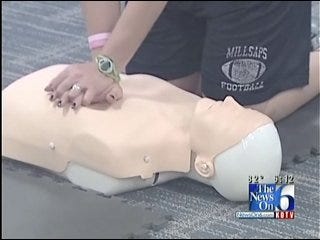EMSA: New CPR Guideline Will Help Save Lives
The American Heart Association has new guidelines for CPR training, after research proved a simpler method works better.Monday, October 18th 2010, 8:44 pm
By Emory Bryan, News On 6
TULSA, Oklahoma -- The American Heart Association has new guidelines for CPR training, after research proved a simpler method works better.
It's going to be rolled out in training courses, and in the instructions 911 operators give over the phone.
The change makes performing CPR easier and more effective. It eliminates giving mouth to mouth "rescue breaths" - a step that made some people reluctant to help a person in cardiac arrest.
"But when it comes to putting their mouth on somebody, I don't care if you're worth millions or a homeless person, it's very hard for people to do that, and that's part of the reason they don't do it correctly," said Mike Kisler of EMSA.
At EMSA, paramedics will continue using a more advanced form of CPR, but they expect the new guidelines to help lay people save lives.
"If they're at least doing CPR, that gives that patient a chance of surviving a cardiac arrest even," Kisler said.
The old guidelines were "ABC" - open the airway, give breaths and start compressions. The new guidelines are start compressions - then only for trained rescuers - open the airway and give the breaths.
The research determined the most important thing is the chest compressions need to be deep and rapid.
The American Heart Association claims in a video: "This new order makes it easier because anybody can start out with compressions - even with no CPR training. Just push hard and fast on the center of the chest. If you haven't been trained, keep pushing until help arrive."
"And that's honestly the easiest way to tell people, there are numbers to go along with it, but if you just tell people to push hard and push deep, they're going to be close enough," Kisler said.
The chest compressions move blood around the body - and according to Kisler - that's what makes the most difference in the outcome - and that's why the guidelines were changed.
The American Red Cross hasn't changed its courses yet, but plans to train 5 million in the new method within the next year.
More Like This
October 18th, 2010
September 29th, 2024
September 17th, 2024
Top Headlines
December 12th, 2024
December 12th, 2024
December 12th, 2024
December 12th, 2024











